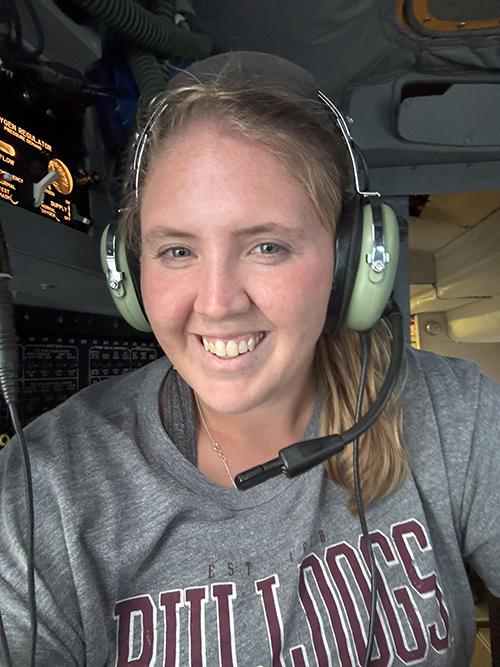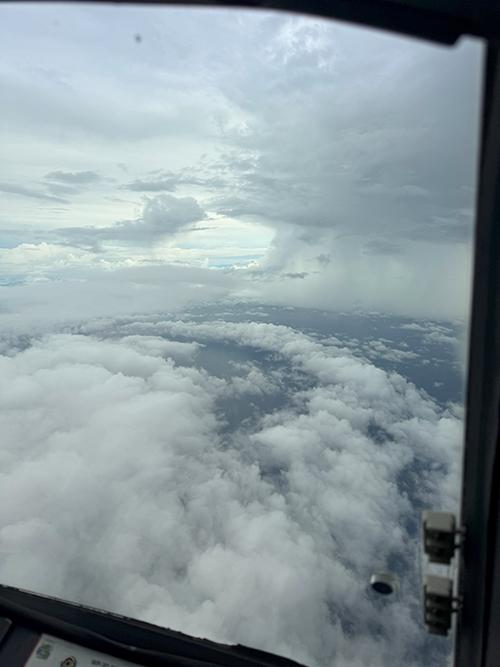Into the Eye of the Storm: MSU Ph.D. student studies hurricanes from the inside out
Contact: Sarah Nicholas
STARKVILLE, Miss.—Mississippi State Ph.D. student Kayleigh Addington took hands-on, experiential learning to a new level last month when she joined the National Oceanic and Atmospheric Administration’s Hurricane Hunters for a research flight into Tropical Storm Imelda as it churned across the Greater Antilles, the Bahamas and Bermuda.

Addington, a doctoral student in MSU’s Department of Geosciences and research assistant through the university-based Northern Gulf Institute, studies Earth and atmospheric sciences. Her work is supported by the Office of Naval Research through a grant awarded to her MSU advisor, Associate Professor of Geosciences Johna Rudzin Schwing.
“My interest in hurricanes began with Hurricane Katrina in 2005,” said Addington, a native of Lexington, Virginia. “I was only 6 years old. Seeing The Weather Channel broadcasts from the days leading up to and immediately following landfall near New Orleans piqued my interest. Since then, it has been my dream to study the factors influencing tropical cyclone structure and intensity and fly with the Hurricane Hunters.”

Addington’s research is part of the ONR’s Study on Air-Sea Coupling with Waves, Turbulence and Clouds at High Winds, or SASCWATCH, hurricane field campaign, which advances understanding of the air-sea interface in tropical cyclones. She focuses on variations in surface drag estimates obtained from dropsonde weather instruments launched from NOAA’s Lockheed WP-3D Orion aircraft.
After expressing interest in participating in a flight to a coprincipal investigator for SASCWATCH, Addington was invited on September’s mission. On board the NOAA flight into Tropical Storm Imelda, Addington observed data collection firsthand.
“Since my research is closely related to spatial variations in the wave field, it was very interesting to see how the clouds and ocean surface changed as we flew through the storm,” she said. “Seeing the sunset while flying through the storm was also incredible. As expected, the convective regions were pretty bumpy with respect to turbulence, and it was interesting to experience how the amount of turbulence changed throughout the flight. It truly was a dream come true.”
During the flight, Addington observed how pilots navigated through the storm, when and how dropsondes were launched and how the collected data were processed in real time.
“Dropsondes return vertically-stacked observations of wind speed and barometric pressure, among other variables, in extreme, offshore environments that are otherwise very difficult to sample,” she said. “These measurements are critical for real-time storm updates as well as research aimed at improving hurricane models.”
For Addington, her future career goal is clear: helping communities better prepare for storms.
“My research could lead to more accurate intensity forecasts as well as a better understanding of the scope of on-land impacts of tropical cyclones,” she said. “This can improve the efficiency of disaster preparedness plans, which is what matters most.”
Experiences like these can serve as a catalyst, helping students launch into their future careers, Rudzin Schwing said.
“They not only connect students to actual data they are using, which helps promote research independence and stewardship, but they also provide invaluable networking experience with potential future research connections or partners,” Rudzin Schwing said.
Addington holds a bachelor’s degree in meteorology and geography and master’s degree in geography, with a certificate in disaster resilience and risk management, both from Virginia Tech.
For more information about MSU's College of Arts and Sciences and the Department of Geosciences, visit www.cas.msstate.edu and www.geosciences.msstate.edu.
Mississippi State University is taking care of what matters. Learn more at www.msstate.edu.